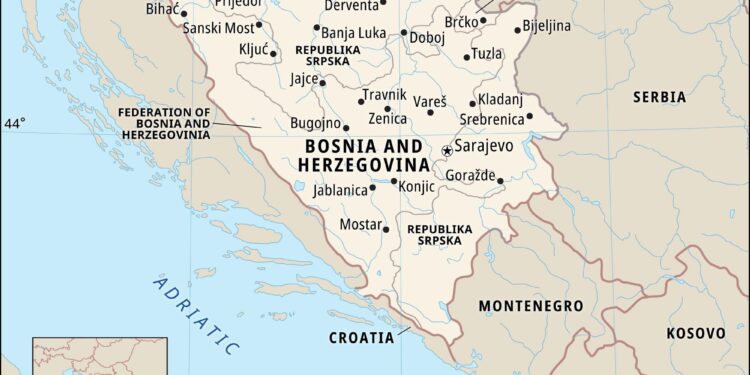As Bosnia continues to grapple with the enduring legacies of its violent 1990s conflict, a new wave of apprehension is emerging among those returning to their hometowns after years of displacement. Recent reports highlight growing fears of a “worst-case scenario” unfolding, as political tensions, ethnic divisions, and economic instability threaten to undermine fragile post-war recovery efforts. This article explores the challenges faced by returnees in Bosnia, revealing the complex reality behind headlines of peace and reconciliation in the Balkans.
Fears Escalate Among Post-War Returnees as Property Disputes Persist
Returning families in Bosnia face mounting anxiety as unresolved property disputes hinder their efforts to rebuild lives after the war. Despite numerous international interventions and local legal reforms, many returnees still encounter contested ownership claims, legal ambiguity, and administrative delays that threaten their ability to reclaim ancestral homes. These challenges not only fuel mistrust in institutions but also complicate community reintegration and economic recovery, leaving thousands in limbo with limited access to essential services.
Key obstacles confronting returnees include:
- Conflicting ownership records dating from different ethnic administrations during and after the war
- Delays in court proceedings exacerbated by understaffed local municipalities
- Intimidation and harassment by competing claimant groups
- Insufficient state support for legal aid and dispute resolution mechanisms
The impact is measured not only in personal hardship but also in broader social tension, as sporadic flare-ups over property rights threaten to destabilize fragile ethnic coexistence within returning communities.
| Issue | Impact | Stakeholders Involved |
|---|---|---|
| Ownership Documentation Gaps | Legal uncertainty, contested claims | Returnees, Local Courts |
| Judicial Delays | Prolonged displacement | Court System, Municipalities |
| Harassment by Claimants | Security threats, forced migration | Competing Ethnic Groups |
| Limited Legal Support | Unequal access to justice | State Authorities, NGOs |
Navigating Ethnic Divides and Security Concerns in Rebuilding Lives
Returning families in Bosnia face a harsh reality defined by deep-seated ethnic tensions and the constant shadow of insecurity. The post-war landscape remains fraught with challenges that hinder the rebuilding of communities, as many are reluctant to settle in areas dominated by other ethnic groups. Reports from returnees highlight fears of intimidation, property disputes, and lack of trust in local institutions, making the prospect of living peacefully seem distant. These social fractures are compounded by limited economic opportunities and insufficient governmental support, which together stall efforts at reconciliation and rehabilitation.
Key Challenges Faced by Returnees:
- Ethnic segregation impeding integrated community life
- Security concerns including threats and harassment
- Unresolved property restitution cases
- Weak local governance and police presence
- Lack of investment in infrastructure and social services
| Issue | Impact | Potential Solution |
|---|---|---|
| Ethnic Segregation | Continued social division and mistrust | Community dialogue programs |
| Security Threats | Fear-driven displacement | Enhanced police patrols and monitoring |
| Property Disputes | Legal stagnation and conflict | Expedited legal reform and mediation |
Calls for Government Intervention and International Support Grow Urgent
The deteriorating conditions confronting post-war returnees have ignited urgent appeals for decisive government intervention and enhanced international assistance. Amid rising tensions and socio-economic instability, local communities are facing challenges that threaten to unravel hard-won peace. Advocates emphasize that without prompt action, the situation risks escalating into a full-blown crisis, undermining both security and social cohesion in the region. Calls highlight the need for comprehensive policy reforms focused on housing, employment, and reconciliation initiatives that directly address the multifaceted hardships of displaced populations.
International organizations and humanitarian agencies have also been implored to strengthen their support through increased funding, technical aid, and diplomatic engagement. Key demands include:
- Expanded housing programs to prevent displacement and homelessness
- Economic revitalization projects aimed at generating sustainable employment
- Legal frameworks safeguarding property rights and minority protections
- Psychosocial services addressing trauma and community reconciliation
| Priority Area | Required Action | Expected Outcome |
|---|---|---|
| Housing | Reconstruction and subsidies | Reduced displacement |
| Employment | Job creation programs | Lower unemployment rate |
| Legal Protection | Property rights enforcement | Increased security |
In Conclusion
As Bosnia continues to grapple with the long shadows cast by its war-torn past, the fears voiced by returning residents underscore the fragile state of reconciliation and security in the region. With unresolved ethnic tensions and political instability still prevalent, the prospect of a “worst-case scenario” remains a pressing concern for both locals and international observers alike. The path forward will require sustained commitment from all stakeholders to ensure that the wounds of the past do not deepen into fresh divisions, and that those seeking to rebuild their lives in post-war Bosnia can do so with confidence and safety.
















